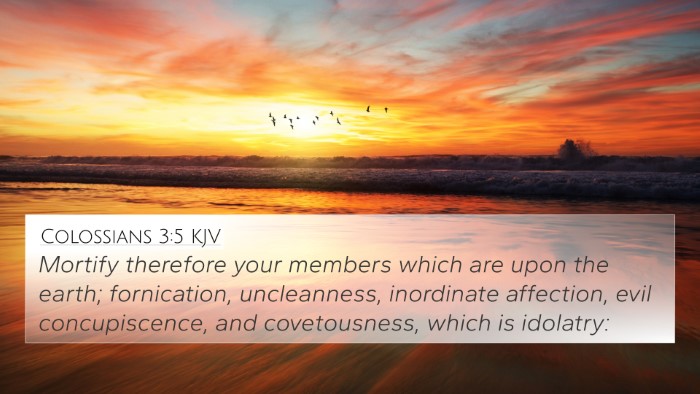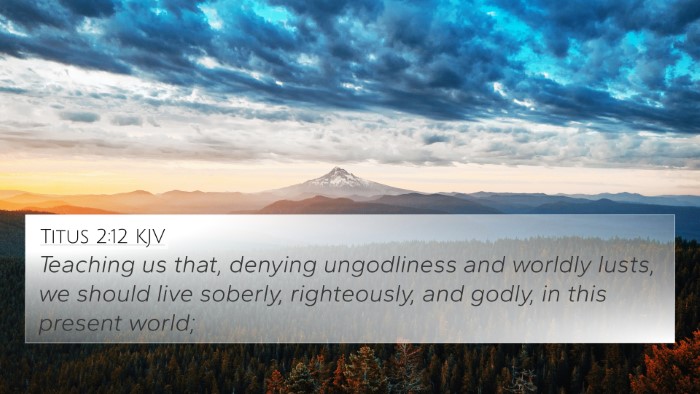Ezekiel 11:18 - Summary and Interpretation
Ezekiel 11:18 states: "And they shall come thither, and they shall take away all the detestable things thereof and all the abominations thereof from thence." This verse addresses the future restoration of God's people and the purging of sin from their midst. The following insights summarize its meaning as interpreted by classic public domain commentaries.
Contextual Understanding
This verse is located within a prophetic vision given to Ezekiel during the Babylonian exile. The Israelites are encouraged to anticipate a time when they will return to their homeland, purging the idolatrous practices that led to their downfall.
Insights from Matthew Henry
Matthew Henry emphasizes that God’s promise of returning His people indicates His mercy. He notes that this return will not just be physical but will involve a spiritual restoration as well. He writes about the importance of cleansing the land from detestable practices that offend God, aligning this cleansing with God's holiness.
Insights from Albert Barnes
Albert Barnes highlights that the act of gathering God's people signifies unity among them and restoration to God's favor. He interprets the “detestable things” as a representation of their sins and abominations, which must be put away to enjoy divine blessings once again. Barnes connects this to themes of repentance and divine forgiveness.
Insights from Adam Clarke
Adam Clarke provides a detailed examination of the phrase “take away all the detestable things.” He underscores that the intention of this removal is for the establishment of true worship in purity. Clarke notes that the reformation of the hearts and lives of the exiled people is critical, which highlights the theme of transformation in their covenant relationship with God.
Thematic Connections
The verse speaks to several major themes in the biblical narrative:
- Restoration: A key theme in the prophets, signifying not just a physical return but also a spiritual renewal.
- Cleansing: The need to purge sin for God's acceptance and blessings.
- Repentance: A necessary step for receiving God's mercy and favor.
- Divine Promises: Assurance that God will act on behalf of His people despite their disobedience.
Cross-References to Ezekiel 11:18
Several verses throughout the Bible resonate with the themes presented in Ezekiel 11:18. Here are notable cross-references:
- 2 Chronicles 7:14: Calls for humility and repentance for healing and restoration.
- Isaiah 52:11: Urges the people to depart from unclean practices.
- Jeremiah 25:5: Warns of impending judgment while also calling for repentance.
- Ezekiel 36:25-27: Promises a new heart and spirit to enable obedience.
- (Hebrews 10:22): Discusses drawing near to God with a pure heart.
- Malachi 3:2-3: The refining process of God's people, purging them of impurities.
- Acts 3:19-20: The call to repentance and the promise of refreshing from God's presence.
- Revelation 21:27: Affirms that nothing impure will enter the New Jerusalem.
Bible Verse Parallels and Connections
The insights related to Ezekiel 11:18 are crucial for understanding the broader narrative of restoration found throughout the Bible. By comparing various texts, we can identify connections that indicate a consistent message about God’s character—His holiness, grace, and the transformative power of repentance.
Tools for Bible Cross-Referencing
To delve deeper into the connections between Bible verses, there are several tools available:
- Bible Concordance: Use it to find references to specific themes or words.
- Bible Cross-Reference Guide: Helps in identifying interconnections between different scriptures.
- Bible Study Software: Engaging resources that facilitate thematic studies and cross-references.
- Commentaries: Such as those by Matthew Henry, Albert Barnes, and Adam Clarke offer extensive insights.
Practical Applications
Understanding Ezekiel 11:18 and its surrounding messages can greatly enrich one's spiritual life. Here are some applications:
- Reflect on Personal Habits: Identify areas in your life that may need cleansing and transformation.
- Seek Community Restoration: Engage with others in a journey of repentance and collective purity.
- Embrace God’s Promises: Reassure yourself of God’s ability to restore and transform through faith.
Conclusion
In examining Ezekiel 11:18, we gain not only historical context but also profound insights into the nature of God’s desire for His people. The emphasis on cleansing and restoration acts as a reminder that God is ever willing to forgive and lead His people back to Himself. Through comprehensive study and the use of cross-referencing tools, believers can deepen their understanding of scripture and the beautiful interconnections within the Bible that highlight God’s redemptive purposes.














